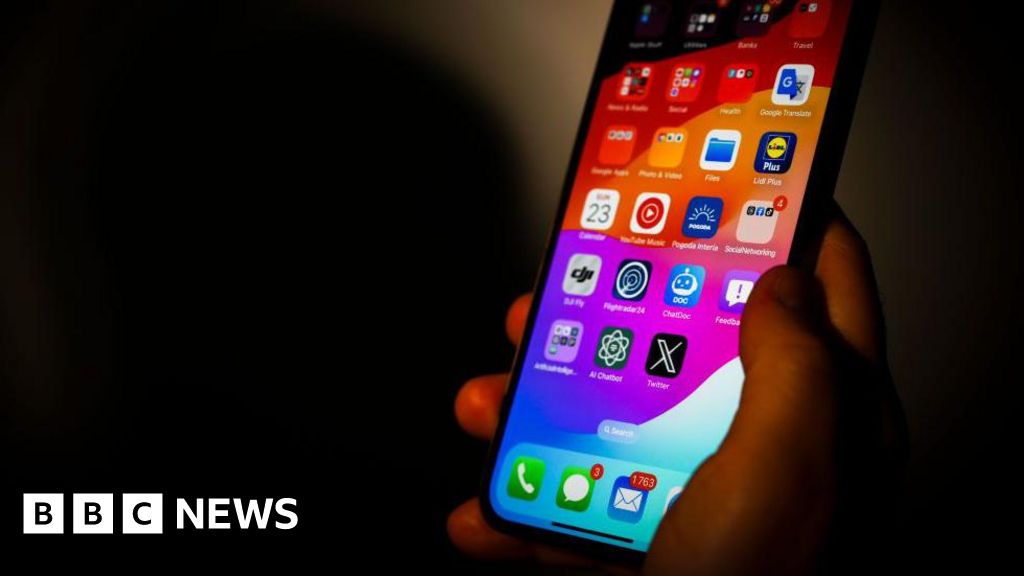Image source, Getty Images
- Author, Matthew Wall
- Role, Technology reporter
Our mobile phones are getting a lot smarter, but what about the telecom networks they run on?
It’s called Apple Intelligence, and will also be included in the phones’ Siri chatbot, with the aim of making them easier and faster to use. And make Siri even more of a personal assistant.
It follows Samsung’s Galaxy AI and Google’s Gemini AI for its own Pixel handsets.
This increase in the use of AI means that phones will do a lot more computing work, and that means they will produce and use a lot more data. This will put even more pressure on mobile phone networks such as the UK’s O2, EE, Vodafone and Three.
To help them cope, telecom companies like these are also increasingly introducing AI, says Ian Fogg, director of network innovation at research consultancy CCS Insight.
“Network operators use AI to dynamically manage the radio frequencies, to provide an optimal level of service. And, for example, to manage transmission towers so that they use less energy in times of lower demand.”
Such increased use of AI to manage mobile phone networks is now very global. In South Korea, Korea Telecom is now able to locate and resolve faults in under a minute thanks to AI-powered network monitoring, said Alex Sinclair, chief technology officer of the GSMA, the body that represents global mobile operators.
Meanwhile, in the US, AT&T uses predictive AI algorithms, based on trillions of past network alerts, to warn when something is about to go wrong.
Other operators, such as Vodafone, use AI digital twins – virtual digital replicas of real equipment, such as masts and antennas – to continuously monitor how their networks are performing.
And AI is also being used to manage how increasingly large data centers use energy to keep their servers cool and optimize storage capacity.
The explosion of data resulting from the increased use of AI is another reason why telecom companies around the world continue to invest in so-called 5G Standalone mobile networks. These use new, dedicated 5G infrastructure rather than partially relying on upgrading the older, less efficient 4G system.
5G Standalone offers much higher speeds and capacity. But some experts believe that even this higher-spec technology will not be enough to meet the demands of the AI era.
For example, at this year’s Mobile World Congress in Barcelona, some experts argued that AI will only reach its full potential after the rollout of 6G from 2028.
Although mobile customers usually only notice the network when something goes wrong, they are much more aware when customer service is poor, with all the reputational damage that entails for brands.
The industry also hopes that AI can radically improve the way they interact with and serve customers.
For example, the Global Telco AI Alliance – a joint venture consisting of Deutsche Telekom, e&, Singtel, Softbank and SK Telecom with 1.3 billion customers in 50 countries – wants to develop an AI chatbot specifically tailored to the telecom sector, and the kind questions that customers usually ask.
This specially trained chatbot can handle most basic customer queries, freeing up call center staff to focus on more complex matters, the alliance’s founders hope.
Image source, Getty Images
Meanwhile, Vodafone is working with Microsoft’s Azure OpenAI Service to improve its customer service, led by its digital assistant Tobi, which communicates with more than 40 million customers monthly in 13 countries and in 15 languages.
The more Tobi can answer customer questions without the need for human intervention, the fewer complaints there are likely to be, which is good for the bottom line and company reputation.
“We see AI primarily as a ‘virtual assistant’ for people,” says Scott Petty, Chief Technology Officer of Vodafone. “We are already seeing AI free up Vodafone employees time from tedious, repetitive manual work, allowing them to focus on more creative activities that benefit our customers and the environment.”
AI also frees up client agents to work on more complex cases, he argues. Vodafone also says Azure OpenAI helps customers find what they are looking for more easily on its websites, with early evidence showing a doubling of the number of successfully completed online customer journeys and a 10% reduction in follow-up calls.
While many commentators worry that AI could lead to massive job losses in the telecoms sector as menial tasks become increasingly automated by software, GSMA leader Sinclair believes it could actually be empowering, especially for lower-income countries.
“AI will give emerging markets a specialized tool to help them catch up,” he argues. “We are in favor of democratizing AI so that not only the rich can use it.”
He believes some of the ominous talk about AI has been exaggerated, so he’s taking a more optimistic tone.
It is a view shared by Ian Fogg of CCS Insight: “AI has been around for several years and is used for specific [telecoms] fallen. But now it’s being applied to many more areas – networking, devices, software – so that every tool we use now has the potential to become much, much better.
“AI has the potential to make networks greener and the world more efficient.”
